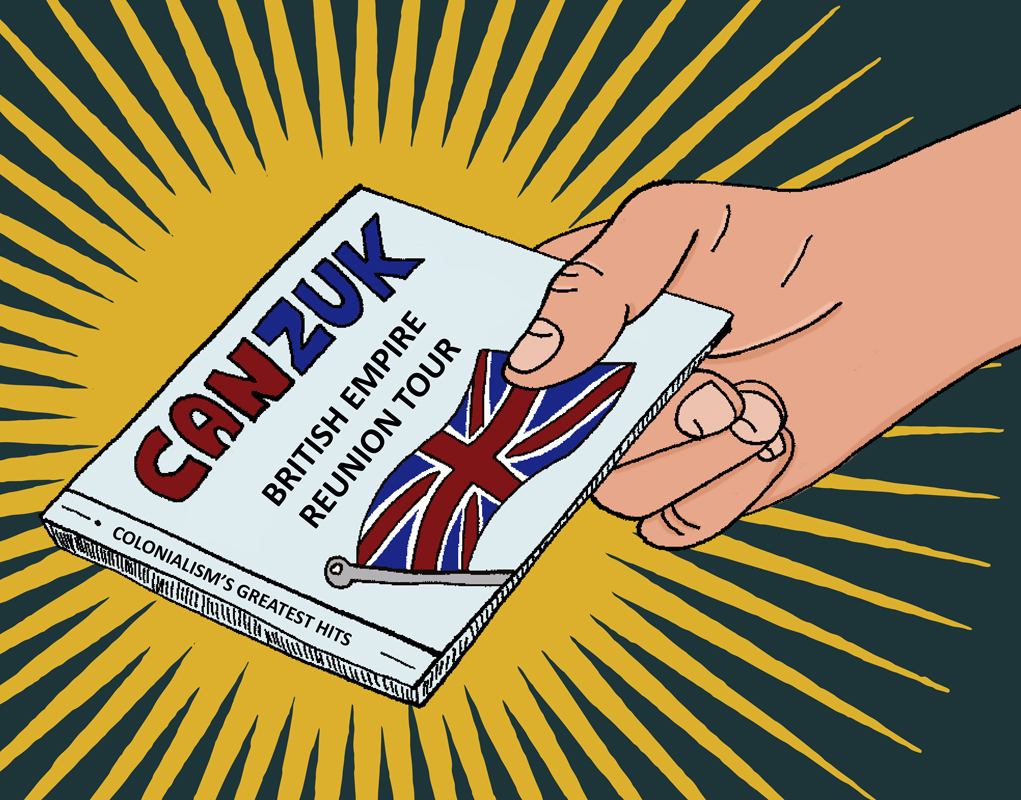CANZUK is a theoretical diplomatic union, similar to the European Union, between Canada, Australia, New Zealand, and the United Kingdom. It would allow free trade, free movement for citizens, and coordinated foreign policy between the four constituent countries. While it has been a topic of discussion for years, it could become a reality in the near future since Conservative leader Erin O’Toole has placed it among his campaign priorities.
For the average Canadian, this may sound like a sweet deal: no more steep international tuition when studying abroad, no more import fees hiking up the price of Flake bars, and, hypothetically, more economic independence from the U.S.A. However, CANZUK has been criticized for only including Commonwealth countries that look the most like the U.K. in terms of governance, legal systems, language, and culture, making it appear to be “a reheated Edwardian fantasy of a globe-spanning Anglosphere acting as a world power,” as reporter Aris Roussinos puts it. CANZUK International (CANZUKI), a Toronto-based advocacy organization devoted to promoting CANZUK, denies allegations of racism — but if CANZUK really isn’t based on an imperialist’s self-indulgent daydream, its proponents need to do a better job of proving it.
CANZUKI has both a YouTube video and a frequently asked question (FAQ) entry about whether or not CANZUK is racist, but in both, the organization dances around the question. The YouTube video assures viewers that the benefits of CANZUK won’t be withheld from people of colour within the constituent countries, and in its FAQ, CANZUKI attempts to refute the idea that CANZUK is an alliance of white countries by citing how the four constituent countries “openly embrace diversity and multiculturalism.”
CANZUKI also mentions that the European Union also consists of white-majority countries, with the implication that you wouldn’t call the EU racist. However, this is a false equivalence; the European Union is in Europe, which is where white people come from. When people ask if CANZUK is a racist endeavour, they aren’t necessarily asking if it would be discriminatory, but if it would reinforce structural racism in its four constituent nations, and on the world stage. The problem isn’t that Canada, Australia, and New Zealand are majority white, but that they’re majority settlers — because they were violently colonized and settled by CANZUK’s other constituent country, the U.K.
CANZUK’s constituent nations are neither geographically (except for Australia and New Zealand) nor economically close. Their strongest ties — language, dominant culture, and legal and parliamentary systems — all come from their colonial histories. Only Britain’s most successfully colonized countries are being considered for inclusion in CANZUK. CANZUK proponents’ generally justify the exclusion of other Commonwealth countries by bringing up “brain drain”, a term which refers to the movement of skilled workers from one (usually low- or middle-income) country to another in pursuit of higher wages, better education, or a higher standard of living. Theoretically, this leads to a shortage of needed professionals, such as doctors and engineers, which prevents poor countries from developing. CANZUK proponents argue, however paternalistically, that the exclusion of low- and middle-income countries would be for their own protection, positioning mass immigration as a threat to economic stability, housing, and public services — both in countries people would be emigrating from, such as South Africa, India, and Pakistan, and in the four CANZUK countries they would be moving to. However, this assumes that there are jobs and infrastructure for improvement available in low-income nations, which is not always the case. Brain drain places the onus of economic development on individuals rather than governments.
Other reasons cited for excluding other Commonwealth countries (in CANZUKI’s YouTube video, for example) include high crime rates in other Commonwealth countries like South Africa and Pakistan. This implies a host of racist and xenophobic arguments about how immigration spikes the crime rate. This was a key (though baseless) talking point in Britain before Brexit, but, in Canada, statistical analysis has indicated that immigration is actually associated with a slightly reduced property crime rate.
If CANZUK did come into existence, it would be based in colonialism, and, yes, racism. Even if CANZUK were modified to be more than a greatest hits album for the British Empire, it still wouldn’t be a good fit for a Canada devoted to reconciliation.
Advocates for reconciliation between the Canadian government and Indigenous nations within Canada have repeatedly pointed out how Canadian law is not well-suited for the task; in the conflict over the Wet’suwet’en pipeline, for example, Coastal Gaslink (CGL) was acting within the bounds of Canadian law when building the pipeline, but both CGL and the Canadian government were in flagrant violation of Wet’suwet’en law. Proponents of CANZUK cite the similarity between the four nations’ legal systems as a reason why they are more compatible than other Commonwealth countries, and, in the EU (a comparable diplomatic union), EU law takes precedence over national law, ensuring legal consistency. If Canada joined CANZUK without ensuring it had the freedom to work with and defer to Indigenous law, CANZUK membership would seriously interfere with legal reconciliation.
Though many Canadians would see some benefits from CANZUK, primarily in terms of education and employment opportunities abroad, its problems are deeply rooted in Britain’s legacy of colonization. On the global scale, CANZUK would be an ineffectual trophy case for Britain’s favourite children, and for Canada it would be a huge step backward on the path to reconciliation — or a step off of it entirely.


